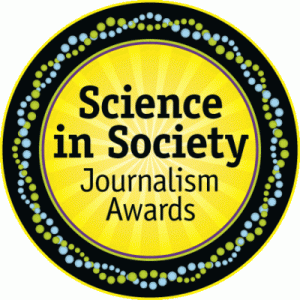About the Science in Society Journalism Awards
Science in Society Journalism Awards
Entries for the 2014 Science in Society Journalism Awards are now closed. Next year's awards open in December 2014. Read the rules below for general information.
Categories for 2014:
- Books
- Commentary and opinion
- Science reporting
- Science reporting for a local or regional market
- Longform science reporting
The purpose
NASW established the Science in Society awards to provide recognition — without subsidy from any professional or commercial interest — for investigative or interpretive reporting about the sciences and their impact on society. NASW especially encourages entries of critical, probing pieces that would not receive an award from an interest group. Beginning with the first award in 1972, previous winners have demonstrated innovative reporting that goes well beyond the science itself and into the ethical problems and social implications. A committee of accomplished peers judges the entries each year.
The awards
NASW will award separate cash prizes of $2,500 for writing judged best in each of five categories: books, commentary or opinion, science reporting, science reporting for a local or regional audience, and longform science reporting. All prizes will be platform independent. We’re open to entries from print, broadcast, and online journalists. Winners and their publishers/broadcasters will also receive certificates. The 2014 awards will be presented at an awards dinner the weekend of October 18, 2014, in Columbus, Ohio. Reasonable travel and hotel expenses of the award winners will be reimbursed. In cases of multiple authors or producers, only one person’s expenses will be covered, and the prize money will be split between the entrants at their discretion. The prize money is intended for content authors or producers, not publications.
Eligibility
Any writer (or team) is eligible to submit one entry in each category. All entries should be attributed to a bylined creator or creators.
Work must be written or spoken in English, intended for the lay adult, and first published or broadcast in North America between Jan. 1, 2013, and Dec. 31, 2013. Winners of last year’s awards and individuals who have won three times are not eligible.
Entries should exhibit clear relevance to society as a whole. Pure science articles, without that relevance, will not be considered.
Categories for 2014
It is your responsibility to enter in the appropriate category. Miscategorized entrants (eg, reporting in the opinion category) will be disqualified. For entries of 5,000-6,000 words or 8 ½-10 minutes, it is at the entrant’s discretion to choose either the Longform category or another category based on best-fit.
Rules for Submission
- Please follow the rules carefully. Submissions that do not follow these procedures will not be considered.
- Any person, including the author(s), may submit material. Entrants may submit only one entry per category.
- There is no submission fee.
- Entries must meet the purpose stated above. Material about significant advances in science, no matter how well written, will be ineligible if the relevance to the broader society is unclear.
- Only online entries will be accepted.
- With the exception of the Book category, in which hardcopies may be required, all entry material must be uploaded to be part of the entry. (For ebooks with no print edition, please send 10 electronic copies, as outlined below.) Once submitted, an entry may not be altered or edited.
To Enter
Visit the entry page and complete all steps of the online entry process by 11:59PM Eastern on February 1, 2014. Your entry is not complete until you receive a confirmation email.
Please adhere to the following file formats and sizes:
- Documents: PDF, max 10 MB (to minimize file size embedded images should be JPG/JPEG, 96 DPI, which is sufficient for web resolution)
- Audio: MP3, max 70 MB
- Video: MPG or .WMV, max 70 MB
You may also provide the entry as a web address, particularly if the file is too large for these limits. Those entering websites need only provide a working URL (with a password allowing cost-free access if necessary). Provide the URL(s) in a pdf uploaded in the entry section.
Note: There is a 70 MB limit for uploaded audio and video, which should be sufficient for the majority of entries, e.g. ~24 minutes of audio with a 3:1 compression ratio that allows for excellent sound quality preservation falls under 70 MB. For audio or video pieces larger than 70 MB, a one to three minute clip should be uploaded and the complete entry should be shipped on DVD or CD (see below). Shorter radio or television entries must be submitted entirely online. If shorter pieces are mailed rather than uploaded, they will not be considered.
Instructions to mail Book Entries or Audio/Video Files over 70MB will be provided during the entry process, but please note that any materials must be postmarked no later than February 1, 2014, to be considered. Submissions will be accepted only at the provided P.O. Box. NOTE: FedEx and UPS do NOT deliver to P.O. boxes.
For questions, contact:
Science in Society Awards Committee chairs:
- Amber Dance
- Dennis Meredith




